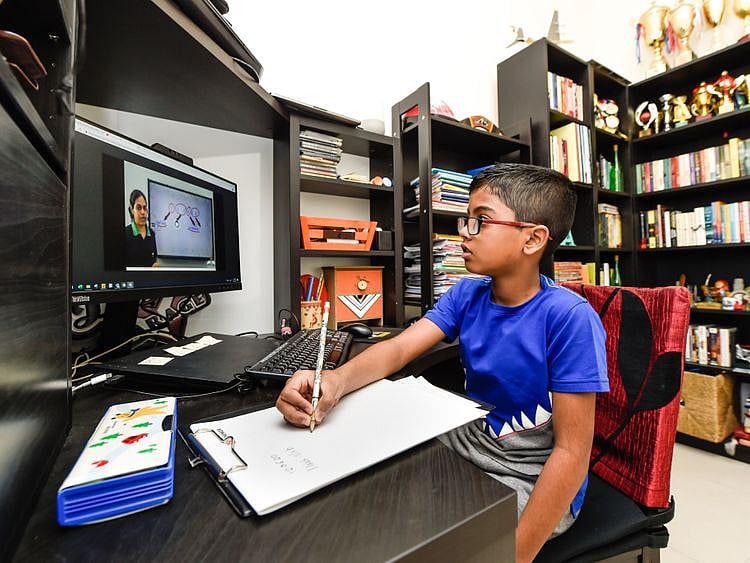COVID-19: Neutral backdrops, no pyjamas - strict rules for distance classes in UAE
Private video conferencing barred; e-security and decorum must for webcam sessions

Dubai: Teachers and students video conferencing for online classes have to safeguard privacy and security concerns, UAE schools have said.
The rules and guidelines were set as schools have moved online as a precaution against coronavirus.
The instructions by schools cover various aspects such as dress code, one-to-one chat, recording and cyber-security, also include advice for parents, most of whom are also working from home to avoid the spread of COVID-19.
Directions from some schools can go into details such as what background to have – “neutral” or “professional” – when going live or what tone of voice to use.
Safeguarding students
Uptown International School Principal Chris Bromham said video conferencing does raise issues about student conduct and safeguarding.
“Students are asked not to record any interactions or take screenshots of other participants. We have also taken the difficult decision to ask students to turn off their cameras. This is especially important for one-to-one conversations. However, the ideal situation is that a parent or adult sits with the student during these conversations. Then the camera can be switched back on,” he added.
Carrie Hoza, Principal, Dubai British Foundation, has told teachers that conversations should never take place one-to-one with a student. “A minimum of three students should be in a chat at one time and if small groups are taking part then best-practice is for another adult from the school to be in the meeting, either as an active participant or passive listener,” she added.
Ambassador School in Dubai also does not allow 1:1 teacher-student video conferencing, said principal Sheena Menon, or casual student-to-student chats for that matter. “There is a chat box which is only for the purpose of drawing the attention of the teacher and asking questions or replying. Students should not chat with each other when the class is going on; instead taking turns to ask questions,” she added.
‘Isolation can be difficult’
However, some students have found it hard to switch fully to e-learning, given its limitations on socialising, so a controlled form of peer interaction is allowed online, said Ramesh Mudgal, Principal, Global International Indian School (GIIS) Dubai.
“Suddenly switching to learning in isolation can be difficult for students and the faculty at GIIS understand that very well. The students have an option to chat among themselves – the teacher activates the feature for them when needed. This promotes interaction, but also helps maintain discipline at the same time,” he added.
Keeping watch
While the teacher keeps watch over students, schools keep watch over teachers. Jan Steel, Vice Principal, GEMS Wellington International School (WIS), said all live streaming is recorded and “stored for review and use by students who are, for example, out of the UAE and in a different time zone”.
She added: “Online learning and live teaching sessions are monitored by subject leaders and the wider executive team who have access to all Google Classrooms across the school. Remote learning ‘walks’ and ‘drop ins’ to lessons are frequent to ensure the WIS expected standard of excellence is maintained during the remote learning period.”
Dubai British School, Jumeirah Park, also ensures there is a copy of all text materials exchanged during live e-classes. Summarising the decorum of e-learning, the school said “there are no differences between our professional expectations whether we are in or out of school”.
Rules of the e-classroom
Each school has its own rules, but they generally include:
No one-to-one chat between teacher and student
Student webcam and mic off unless allowed by teacher
No private talk in the chat box between students
Prompt start and end time for e-class
Smart-casual attire expected – no pyjamas
‘Neutral’ or ‘professional’ background in cam view
Logging of chats for review and professional development or future reference
Random drop-ins by school leaders to ensure quality and safe learning
Guide for parents (source: Ambassador School, Dubai)
1. It is helpful to maintain your child’s normal school routine with wake-up alarm, breakfast on the table and set learning hours each day.
2. Ensure that your ward has a device with internet facility, working camera and audio. A headset will be beneficial.
3. Printing and displaying your child’s timetable will definitely be a good start. You can review the day’s tasks together, tick off items that have been completed and congratulate your child on what he/she has achieved.
4. Create a study area, preferably a quiet place away from distractions (all the required stationery and study material to be kept ready) with headphones to block out background noise. We recommend that students dress appropriately and sit at a table on a comfortable chair rather than on a bed or sofa.
5. We advise parents to resist the temptation of helicoptering the ward, rather discuss and set the do’s and don’ts of using the device, trust your children and give them the opportunity to be more responsible and independent.
6. We suggest that usage of digital devices is limited to daytime only so as not to impact sleep patterns. Remember a good night’s sleep is crucial for your child’s mental and physical wellbeing.
7. In the event of your ward not being able to attend classes due to illness, a mail must be sent to the class teacher.
(Source: Ambassador School, Dubai)
Sign up for the Daily Briefing
Get the latest news and updates straight to your inbox
Network Links
GN StoreDownload our app
© Al Nisr Publishing LLC 2026. All rights reserved.